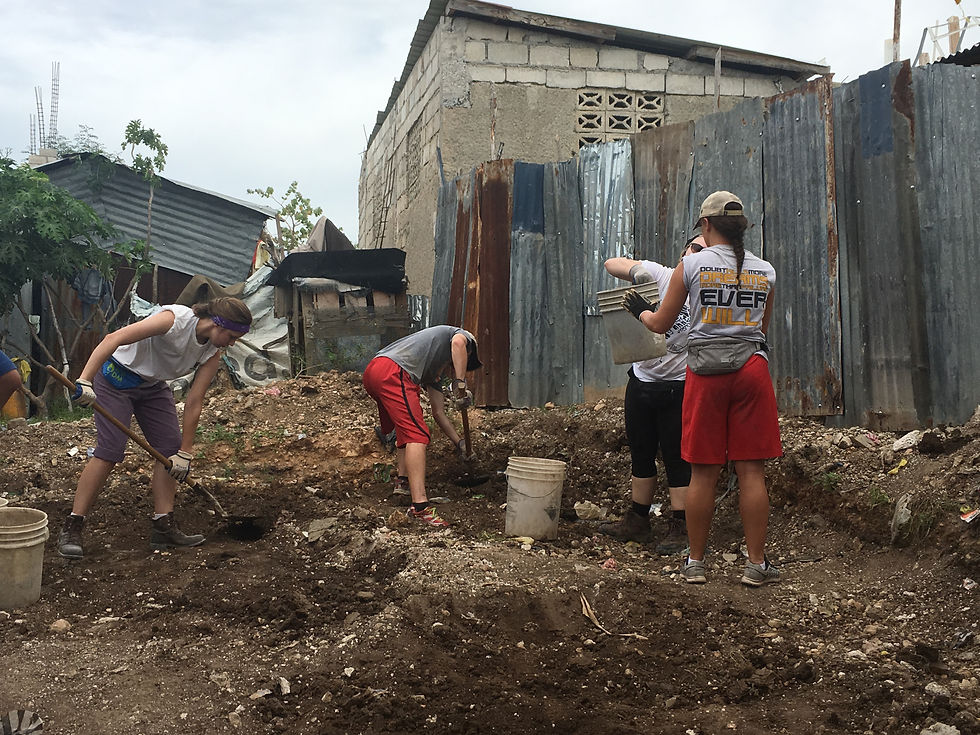
Give of your hands to serve and heart to love!
Sometimes the stories we want to hear the least are the stories we need to hear the most. Imagine a nation with a noble history, but an unstable political system. Haiti was occupied by a powerful neighbor to the north, who undermined its’ existence to benefit their own national interests. America desisted, looted the treasury, slaughtered the opposition, and chased away intellects after an AIDS epidemic destroyed the developing economy. After the younger madman was forced into exile, there were a few years of democratic reform which was halted yet again by America and in the process exiled a leftist leader. They would then hand over control to the UN forces in hopes of establishing a functional democratic government.The country significantly got worse through a cholera epidemic after reeling from many other epidemics. Add an earthquake that decimated the capital and a category four hurricane that swept away the southern portion of the country, you get a pretty clear and messy picture of how Haiti became Haiti.
This is the country that fourteen students, one faculty, one staff, and four chaperons left to go serve for a week on a May term trip. After a long day of traveling we finally arrived at Toussaint Louverture International Airport in Port-au-Prince to begin service learning like I’ve ever experienced. We made our way through the many security check points to find Pouchon (PID employee, driver) and plenty of Haitian men waiting to assist us. As a group, we made our way through the overly crowded parking lot of the airport to find semi-detached, merrily painted, poor physical conditioned bus parked parallel to buzzing street vendors. During the drive through Port-au-Prince to Blanchard I could not overlook the graffiti, trash, unfinished buildings, makeshift businesses and roads. However, seemingly intertwined were schools, churches, ornately decorated vehicles, laughter, optimism, generosity, and love. Before we knew it, we arrived at the PID compound welcomed by Sandra who is the field director. After sorting through the many suitcases full of medical donations, we were treated to our first delicious Haitian cuisine. Knowing we had a day of service ahead we all headed to bed relatively early for most of us.
For a week this was our routine, we would have breakfast, finish the PB&J sandwiches for lunch and head for the work site in Canaan no later than 8:15am. Cars would stream by our bus from all angles and I found myself amazed at how people get from point A to point B safely. Following a crazy twenty-minute drive we arrived at the work site, where we were embraced by children ranging from six years to seventeen years of age. We were told to start digging a 10 foot deep hole that was 12x30 feet in length and width. Quickly, we all realized how hard the day was going to be considering we were sifting gravel into usable grain to be a mixture for concrete, and a pick ax and shovel to get through dirt and years of old trash. Manual labor with no machines. Don’t forget all this was done in the blazing Caribbean sun with ungodly humidity to boost. Taking breaks was crucial not only for our bodies, but personally it was an opportunity to interact with the children. Although they live in the poorest of conditions, they exemplified what it means to love unconditionally and have pure joy. The way they looked out for each other, cared for one other was that of a communal compassion, one that is rarely see in the states. It was remarkable. I rotated back and forth between working and building relationships with the community members.
By the end of the week, we had dug at least five feet deep of the pit. It was done with sweat dripping out of every pore in our bodies. After our final day of working at the bottom of the mountain, we trekked our way to the top of it with children on our hips and on our backs. Slightly out of breath, we gazed out to the view of tin roofs, tarp houses, and the Olympic training center across the way. This view is so distinguishable due to the metaphoric picture it provided us. One of a community struggling and another of the potential of what it could if positive progress is maintained. In all, we made it to the top of the mountain to look at the new expanded view of a once deserted city of Canaan.
As I walk around campus, those that knew of the trip approach me with questions such as “how are you?” and “how was the trip?” Without much thought, I would blare out “oh it was good” or “I really enjoyed it.” Often it was my genuine feeling of the trip, however, in rare occasions it was the quick, easy answer to give. To thoroughly give myself peace and understanding of the trip I formulated this answer: My appreciation for manual laborers has skyrocketed out of this earth. A week in Haiti, spent in two small suburbs, is not long enough to get a true impression of a nation. What I have is a glimpse of the poorest country on the Western hemisphere, some hopeful of development and progress while some are heart breaking images. I listened to a podcast, amd a speaker said, “Even if we are faced with the worst of humanity, we find positive and compassion amongst each other and ourselves!" This quote is relevant to what I experienced because knowingly or unknowingly Haitian people live by this creed. With this hope in mind, I eagerly await to see what is installed for the country!
-- Queensley Odei


































